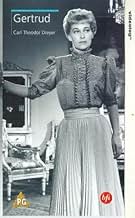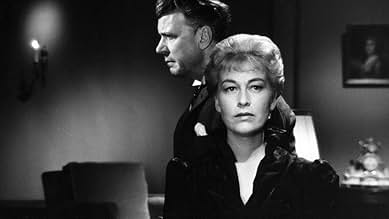IMDb-BEWERTUNG
7,3/10
7156
IHRE BEWERTUNG
Füge eine Handlung in deiner Sprache hinzuIn the elegant world of artists and musicians, Gertrud ends her marriage to Gustav and takes a lover, the composer Erland Jansson.In the elegant world of artists and musicians, Gertrud ends her marriage to Gustav and takes a lover, the composer Erland Jansson.In the elegant world of artists and musicians, Gertrud ends her marriage to Gustav and takes a lover, the composer Erland Jansson.
- Regie
- Drehbuch
- Hauptbesetzung
- Auszeichnungen
- 3 Gewinne & 1 Nominierung insgesamt
Edouard Mielche
- The Rector Magnificus
- (as Edouard Mielché)
Empfohlene Bewertungen
You might be dismayed the first time you view Gertrud. Is this a masterpiece you might ask yourself? Nothing seems to happen. People sit and talk. Sometimes they get up and move about and then go and sit down again. When they do talk, it is not always facing one another. Gertrud herself often appears to be in a trance, staring towards another world, a beyond of perfection where no mortal man can exist or match up to her dreams. By the end of the film she seems to have become as bloodless and lifeless as a statue. Whiteness has overcome her and it is as lethal as the powder in the mill of Dreyer's Vampyr.
This is a film that must be watched several times in order for all its qualities to be revealed. The characters movements are exactly choreographed. The decor is stripped down to its essentials. There is nothing in the frame that does not comment. It might appear on the surface to be a naturalistic film, but it is, in fact, as staged and controlled as any Fellini. Gertrud is about the martyrdom of a woman who seeks perfection in a flawed world. Its surface, is as still, and tranquil, as a lake in a park, but underneath, everything is turmoil and volcanic emotion
This is a film that must be watched several times in order for all its qualities to be revealed. The characters movements are exactly choreographed. The decor is stripped down to its essentials. There is nothing in the frame that does not comment. It might appear on the surface to be a naturalistic film, but it is, in fact, as staged and controlled as any Fellini. Gertrud is about the martyrdom of a woman who seeks perfection in a flawed world. Its surface, is as still, and tranquil, as a lake in a park, but underneath, everything is turmoil and volcanic emotion
If one can get past the utter simplicity of the story and look at the images, it becomes, for me, a striking film. I just returned to watching the films of Dreyer, those that I had not seen. Apparently, this was the last one. Gertrud is as cold as you can make one. She has a determined role for herself and never varies and slips into perpetual unhappiness. She is a standard bearer for feminine longing, but she can't crack through the realities of the world. She has made bad choices and then seems to punish herself and those who can't live to her standards. Worth a look, certainly.
Even by Dreyer's standards "Gertrud" displays a rigidity rare in cinema. When it first appeared critics hated it, (just as they hated "The Searchers" and "Vertigo"). Now, of course, all three films are considered masterpieces but while "Vertigo" and "The Searchers" were commercial films aimed at a mass audience, "Gertrud" was strictly art-house, the kind of film critics were expected to like. It was also Dreyer's last film and it was archetypal Dreyer but this was also the mid-sixties and movies had moved on. We had had a renaissance in France and Italy and Czechoslovakia and even in the UK while America's 'New Wave' was just about to strike. It was a time for young film-makers and Dreyer was an old man. "Gertrud" looked and felt like it could have been made 30 years earlier. Of course, hindsight is a great thing and today "Gertrud" seems more 'modern' than many of the fashionable 'flash-in-the-pan' movies that hit us in the sixties and which now seem like time-capsules from a by-gone age. "Gertrud's" almost somnambulist pace and Dreyer's insistence on long takes, keeping his actors mostly static while allowing his camera to move, however slowly and deliberately, instead now seems almost revolutionary at a time when movies were chiefly about movement and movement in a pell-mell style. While taken from a 1906 play the theme of the film also seems peculiarly modern for the mid-sixties. It's about a woman's liberation from the constraints that men would seek to put upon her, even if that freedom means the sacrifice of romantic love in favour of higher, more intellectual pursuits. At the beginning of the film Gertrud leaves her stuffed-shirt of a husband because he's not prepared to love her unconditionally and attaches herself to a younger man who showers with romantic affection. But his love, too, is a sham and Gertrud is just another of his many conquests, so Gertrud leaves both men, and the poet she truly loved but who put his work above her and has now returned to reclaim her, and settles instead for a solitary but more 'intellectually' satisfying existence. It is a cold movie, it moves at a snail's pace and it is a film of ideas almost devoid of emotion if not feeling, (there is so little happening on screen it often seems like it could just as easily have been done on the radio). The acting is either intensely wooden or deeply cerebral depending on your point of view and since the characters are really only paradigms it is very difficult to engage with any of them. But it is also an incredibly beautiful film, displaying all of Dreyer's visual mastery, (as a 'stylist' Dreyer has always seemed very under-valued), and it's a film that challenges our preconceptions of what a romantic melodrama should be. Even by European art-house standards this is a much more rigorous dissection of the relations between men and women than we are used to. It won't be to everyone's taste but stick with it and you will be richly rewarded with a difficult and a bold film that strives to be a serious work of art and more than succeeds in its aims.
(1964) Gertrud
(In Danish with English subtitles)
DRAMA
Adapted from the play by Hjalmar Söderberg, which the acting is zombie-esque but that is Carl Theodor Dreyer's style, which involves an unhappy housewife, opera singer, Gertud Kanning (Nina Pens Rode) leaving her husband, Gustav Kenning (Bendt Rothe) just when he announces his promotion to become a cabinet minister. She leaves him for someone younger, who is a pianist and struggling composer, Erland (Baard Owe). Viewers get to understand why she has problems with highly successful men as the movie progresses, once she reunites with an old fling. Co-written and directed by Carl Theodor Dreyer that is also his final film.
Adapted from the play by Hjalmar Söderberg, which the acting is zombie-esque but that is Carl Theodor Dreyer's style, which involves an unhappy housewife, opera singer, Gertud Kanning (Nina Pens Rode) leaving her husband, Gustav Kenning (Bendt Rothe) just when he announces his promotion to become a cabinet minister. She leaves him for someone younger, who is a pianist and struggling composer, Erland (Baard Owe). Viewers get to understand why she has problems with highly successful men as the movie progresses, once she reunites with an old fling. Co-written and directed by Carl Theodor Dreyer that is also his final film.
Cinema Great Carl Dreyer's final film is said to be his masterpiece as well. The innovative b&w cinematography, featuring only a handful, drawn out scenes in confined spaces, makes use of mirrors, shadows and suggested action. The story begins ca. 1900, studying several characters in depth. Gertrud, the wife of a wealthy lawyer with political aspirations, feels unappreciated by her work-consumed husband. The viewer quickly learns that Gertrud is about to end what appeared to be years of boredom as the "attache" of a man who lives mainly for his secular accomplishments. Despite his protests and assurances that he couldn't live without her, she leaves to see a lover.
Drawn to men of the arts, Gertrud herself was once a celebrated opera singer. A lengthy love affair with a man who later becomes a nationally honored poet, left the jilted author heart broken. Another man, a pioneer in the field of psychiatry, becomes Gertrud's friend and confidante, but never a lover.
The story, via flashbacks, present action and time scan forward shows Gertrud's entire adult life. The final scene offers somewhat of an explanation for why this woman has seemingly denied herself any true happiness. The men who offered her everything, even with the greatest possible concessions on their part, were told not to bother. Gertrud's extreme sense of pride, as noticed by a young musical genius who sees her as a convenient fling, leaves no wavering of the determined mind.
If this film appeared to be scandalous in 1964, how would society view this kind of real activity in the early 1900s? A strong sense of "truth", as a philosopher may call it, will always override any kind of compromise. "Love is all", the only words on Gertrud's head stone. There must be more to life than strict adherence to an ideology, especially at the high cost. A critically acclaimed film, "Gertrud" nonetheless lacks entertainment value due to its fatalistic story telling
Drawn to men of the arts, Gertrud herself was once a celebrated opera singer. A lengthy love affair with a man who later becomes a nationally honored poet, left the jilted author heart broken. Another man, a pioneer in the field of psychiatry, becomes Gertrud's friend and confidante, but never a lover.
The story, via flashbacks, present action and time scan forward shows Gertrud's entire adult life. The final scene offers somewhat of an explanation for why this woman has seemingly denied herself any true happiness. The men who offered her everything, even with the greatest possible concessions on their part, were told not to bother. Gertrud's extreme sense of pride, as noticed by a young musical genius who sees her as a convenient fling, leaves no wavering of the determined mind.
If this film appeared to be scandalous in 1964, how would society view this kind of real activity in the early 1900s? A strong sense of "truth", as a philosopher may call it, will always override any kind of compromise. "Love is all", the only words on Gertrud's head stone. There must be more to life than strict adherence to an ideology, especially at the high cost. A critically acclaimed film, "Gertrud" nonetheless lacks entertainment value due to its fatalistic story telling
Wusstest du schon
- WissenswertesDespite running 2 hours, there are less than 90 shots in the entire film and only one exterior scene. This may account for the outright hostility that greeted the film from the critical fraternity when it was first released.
- PatzerWhen Gertrud walks across the room in order to give Axel his letters back, the shadow from the camera and equipment can clearly be seen on the back wall.
- Zitate
Gertrud Kanning: There's no happiness in love. Love is suffering. Love is unhappiness.
- VerbindungenEdited into Eventyret om dansk film 15: Fjernsyn og biografkrise - 1961-1965 (1996)
Top-Auswahl
Melde dich zum Bewerten an und greife auf die Watchlist für personalisierte Empfehlungen zu.
- How long is Gertrud?Powered by Alexa
Details
- Laufzeit1 Stunde 56 Minuten
- Farbe
- Sound-Mix
- Seitenverhältnis
- 1.66 : 1
Zu dieser Seite beitragen
Bearbeitung vorschlagen oder fehlenden Inhalt hinzufügen





















